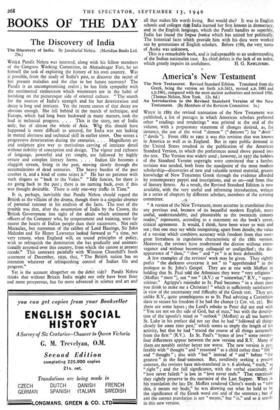BOOKS OF THE DAY
The Discovery of India
WHILE Pandit Nehru was interned, along with his fellow members of the Congress Working Committee, in Ahmadnagar Fort, he set himself the task of exploring the history of his own country. Was it possible, from the study of India's past, to discover the secret of her present maladies and the clue to her future recovery? The Pandit is an uncompromising realist ; he has little sympathy with the sentimental enthusiasm which westerners are in the habit of lavishing on the picturesque side of oriental culture. " The search for the sources of India's strength and for her deterioration and decay is long and intricate. Yet the recent causes of that decay are obvious enough. She fell behind in the march of technique, and Europe, which had long been backward in many matters, took the lead in technical progress. . . . This is the story, not of India only, but of almost the whole of Asia. Why this should have happened is more difficult to unravels for India was not lacking in mental alertness and technical skill in earlier times. One senses a progressive deterioration during the centuries. . . . Magnificent art and sculpture give way to meticulous carving of intricate detail without nobility of conception and design. The vigour and richness of language, powerful and yet simple, are followed by highly ornate and complex literary forms. . . Indian life becomes a .sluggish stream, living in the past, moving slowly through the accumulations of dead centuries. The heavy burden of the past crushes it, and a kind of coma seizes it." He has no patience with such slogans as " back to the Vedas." " Idle fancies, for there is no going back to the past ; there is no turning back, even if this was thought desirable. There is only one-way traffic in Time."
It is, perhaps, inevitable that Pandit Nehru should regard the British as the villains of the drama, though there is a singular absence of personal rancour in his analysis of the facts. The root of the trouble was that, after the assumption of India by the Crown, the British Government lost sight of the ideals which animated the officers of the Company who, by temperament and training, were far nearer the hearts of Indian people than their successors. Not only Macaulay,. but statesmen of the calibre of Lord Hastings, Sir John Malcolm and Sir Henry Lawrence looked forward to " a time, not very remote, when England will, on sound principles of policy, wish to relinquish, the domination she has gradually and uninten- tionally assumed'over this country, from which she cannot at present recede." This contrasts painfully with Winston Churchill's frank statement of December, 1930, that, " The British nation has no intention whatever of relinquishing control of Indian life and progress."
Yet is the account altogether on the debit side? Pandit Nehru thinks that without Britain India might not only have been freer and more prosperous, but far more advanced in science and art and
all that makes, life worth living. But would she? It was in English schools and colleges tlant.India learned her first lessons in democracy, and in the English language, which the Pandit handles so superbly, India has found the lingua fratica which has united her politically. The historical facts which provide him with his data were worked out by generations of English scholars. Before 1786, the very, name of Asoka was unknown,
This is a remarkable book, and is indispensable to an understanding of the Indian nationalist case. Its chief defect is the lack of an index, which greatly impairs its usefulness. H. G. RAWLINSON.


























 Previous page
Previous page